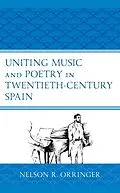In Uniting Music and Poetry in Twentieth-Century Spain, Nelson R. Orringer uses both literary and musical analysis to study sung poems in twentieth-century Spain. In nine chapters, each focusing on an individual sung poem, song cycle, or various poems set by the same composer, Orringer enriches and deepens interpretations of the art-songs by comparing the poet's vision to the composer's. In examining composers such as Falla, Turina, Mompou, Toldrà, Rodrigo, Montsalvatge, and Rodolfo Halffter, Orringer shows that Spanish art-song is an exceptional product of Spain's Silver Age and reveals a new way to understand and appreciate poems set to music in twentieth-century Spain.
Autorentext
Nelson R. Orringer is professor emeritus of Spanish and comparative literature at the University of Connecticut, Storrs.
Inhalt
Introduction: An Imperfectly Known Artistic Legacy
Chapter 1: Falla´s Four Youthful Experiments in Song
Chapter 2: Glorifying Cordoba: Góngora and Falla
Chapter 3: Joaquín Turina´s Musical Sevillanismo in Four Songs
Chapter 4: Frederic Mompou´s Art of Dreaming Music in Combat del somni [Dream Combat]
Chapter 5: The Virginal Voice in Eduard Toldrà´s Six Songs of Castilian Poetry
Chapter 6: The Absent Dulcinea: Joaquín Rodrigo's Song to Music Itself
Chapter 7: Creative Landscapes of Salamanca in Unamuno and Joaquín Rodrigo
Chapter 8: Montsalvatge´s Cinco canciones negras [Five Black Songs]: The Search for Freedom through Music
Chapter 9: Rodolfo Halffter´s Canciones sobre Marinero en tierra [Songs on Sailor on Shore] or Nostalgia for a Spain Left Behind
Conclusions: Silver Age Song-Poems in the Era of Recapitulation
